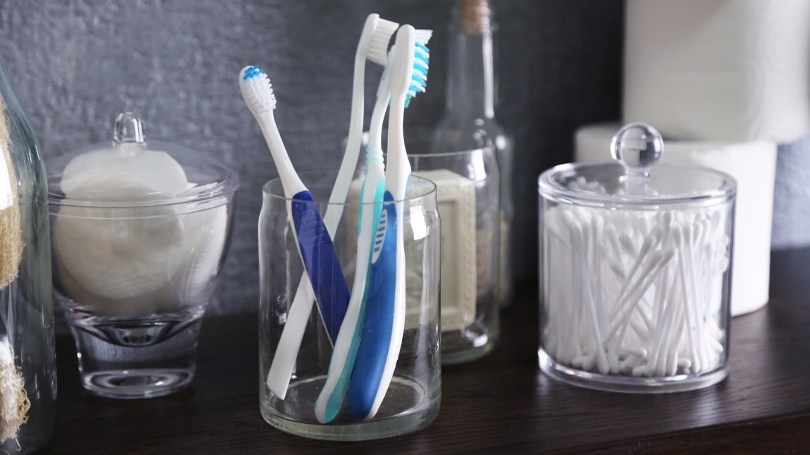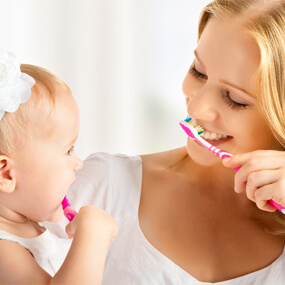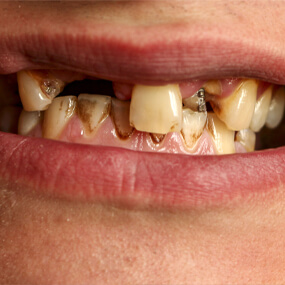Toothbrush Bristles: Soft, Medium or Hard?

If you have purchased a toothbrush recently, you know exactly how overwhelming that choice can be. There are dozens of options, including different colors, head shapes, handle lengths, and so on. When it comes to most of those choices, the American Dental Association considers it a matter of preference. Just pick what you are drawn to, but there is one area that the ADA advises against that: bristle stiffness.
Toothbrush Bristles
The toothbrush has come a long way since the days when man was making bristles from boar and other animal hairs. Modern bristles are predominantly made from nylon, and there are three core classifications of hardness—soft, medium, and hard—but many companies offer a range of bristles within each class.
The Phasing Out of Hard Bristles
The next time you are near the toothbrush section at your local grocery or pharmacy, look for the hardest bristle you can find. You may not even find a product labeled hard, and if you do, it will generally just be a few options and restricted to certain manufacturers. The reason for this is that dentists have lobbied against them. While they certainly remove plaque well, they contribute to erosion of the tooth enamel. They also make people more prone to brushing too hard, which is a problem even with softer bristles.
Are Medium Bristles Bad?
They are not to the degree hard bristles are because they will not damage the tooth enamel if used appropriately. However, medium bristles can still damage the gums and make it easier to brush too hard, which is why many dentists recommend using soft bristles and instead.
Soft Bristles
Soft bristles are good general advice because they are appropriate for everyone. They will not erode tooth enamel, are gentle on the gums, and do not make you prone to brushing too hard, and if you do a thorough job brushing your teeth, the advantages of harder bristles in that regard do not matter.
However, your ideal toothbrush bristle may be a little harder or a little softer, and many dental professionals do recommend opting for the softest bristle that works for you. The bottom line is that it may require some trial and error as well as some input from your dentist. A dentist may even advise extra soft if you had recently had oral surgery or are prone to gum damage and other oral health issues.
Choosing a Toothbrush
The rule of thumb is to choose a soft or extra-soft toothbrush unless you have discussed otherwise with your dentist. The risk of damaging your enamel and gums is real, and whichever bristles you choose, you should always take care to be gentle. You would never choose a steel brush or sweep ultrahard to clean your hardwood floors, so take a similar approach with your teeth. Hard bristles still serve some purposes: they are great for cleaning around the house and in the garage!
Other Toothbrush Tips to Consider
Your bristles will wear out over time and make brushing less effective. The ADA recommends replacing them every three to four months or as soon as the bristles begin to fray. If you get sick, you can continue using your brush for the time being but should replace it as soon as you are healthy.
It is also crucial that you keep your toothbrush clean so as not to contaminate your mouth. Brushes should be stored in the open and in an upright position. When you travel, you can put the toothbrush in a closed container, but air it out as soon as you arrive at the room. You should clean them thoroughly with water from the tap prior to use and after use. It is also recommended that you sanitize your brush once a week. It only takes a few minutes, and you can use a hydrogen peroxide-water mixture.
The ADA recommends brushing twice a day for two to three minutes each session: once in the morning and again before bed. Use fluoride toothpaste. Floss and clean your tongue whenever you brush. Avoid alcohol-based rinses, and use therapeutic oral rinses with moderation.
Brushing for a Healthier Mouth
Whether you are new in the area, seeking a new dentist, or have put off dental care for too long, the team at Scottsdale Cosmetic Dentistry Excellence is here to help you achieve and maintain a beautiful smile. Jeffrey D. Clark, DDS, is a leading dentist in the Scottsdale area that provides modern, personalized dental care and can even help you determine which toothbrush is ideal for you. The oral hygienists at our office are highly skilled, and our support staff is committed to delivering a welcoming and relaxing environment. Call us today at 480 585 1853 with any questions you may have and to schedule your appointment.




